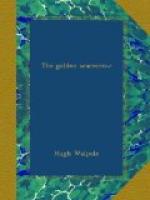“Did he come last night?”
“No.”
“He’ll never come again, will he?”
“No.”
“Wasn’t it silly of you to make up stories like that?”
“Oh, Mary—yes.”
“There aren’t ghosts, nor fairies, nor giants, nor wizards, nor Santa Claus?”
“No; but, Mary, p’r’aps——”
“No; there aren’t. Say there aren’t.”
“There isn’t.”
Poor Barbara, even as she concluded this ceremony, clutching her doll close to her to give her comfort, could not refrain from a hurried glance over her shoulder. He might be—— But upon Mary this all began soon enough to pall. She liked some opposition. She liked to defeat people and trample on them and then be gracious. Barbara was a poor little thing. Moreover, Barbara’s standard of morality and righteousness annoyed her. Barbara seemed to have no idea that there was anything in this confused world of ours except wrong and right. No dialectician, argue he ever so stoutly, could have persuaded Barbara that there was such a colour in the world’s paint-box as grey. “It’s bad to tell lies. It’s bad to steal. It’s bad to put your tongue out. It’s good to be kind to poor people. It’s good to say ‘No’ when you want more pudding but mustn’t have it.” Barbara was no prig. She did not care the least little thing about these things, nor did she ever mention them, but let a question of conduct arise, then was Barbara’s way plain and clear. She did not always take it, but there it was. With Mary, how very different! She had, I am afraid, no sense of right and wrong at all, but only a coolly ironical perception of the things that her elders disliked and permitted. Very foolish and absurd, these elders. We have always before our eyes some generation that provokes our irony, the one before us, the one behind us, our own perhaps; for Mary Adams it would always be any generation that was not her own. Her business in life was to avoid unpleasantness, to extract the honey from every flower, but above all to be admired, praised, preferred.
At first with her pleasure at Barbara’s adoration she had found, within herself, a truly alarming desire to be “good.” It might, after all, be rather amusing to be, in strict reality, all the fine things that Barbara considered her. She endeavoured for a week or two to adjust herself to this point of view, to consider, however slightly, whether it were right or wrong to do something that she particularly wished to do.
But she found it very tiresome. The effort spoilt her temper, and no one seemed to notice any change. She might as well be bad as good were there no one present to perceive the difference. She gave it up, and, from that moment found that she suffered Barbara less gladly than before. Meanwhile, in Barbara also strange forces had been at work. She found that her imagination (making up stories) simply, in spite of all the Mary Adamses in the world, refused to stop. Still would the almond tree and the fountain, the gold dust on the roofs of the houses when the sun was setting, the racing hurry of rain drops down the window-pane, the funny old woman with the red shawl who brought plants round in a wheelbarrow, start her story telling.




